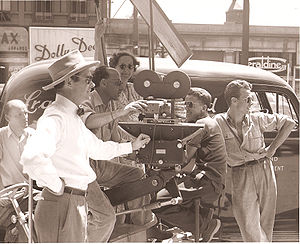HOW TO BREAK INTO THE FILM BUSINESS
FILM CREW NOW

...AND THEN

THE IMPOSSIBLE DREAM
If you're like most people, you assume one of two things: Breaking into the filmmaking business is reserved for those who attended a prestigious film school at a university in California or New York; or, that breaking into the business of filmmaking is an impossibility. Both assumptions would be unequivocally false!
In fact, now more than ever, the opportunity to have a career in the movies is very much a possibility. (Note: Unfortunately, for those of you so inclined, this is NOT an article about becoming a film director or actor. This is how to become a member of the film crew and work behind the camera.)
Film crews are full of people just like you, people who may not have had any idea how they were going to work on movies, or even that they may someday do so.
Criterion DVD - The Film School of DVDs
Film Books
MANIFEST DESTINY
It wasn't that many years ago, that most movies and television shows were made in only a few places, most notably Hollywood (of course), New York, Vancouver and Toronto. But now, with the advent of extremely generous tax breaks towards film production instituted by virtually every state in the U.S., it is possible for someone with little to no training to get their foot in the door and enjoy a film career.
FILM INCENTIVES US & INTERNATIONAL
- EP Incentive Solutions
Learn whether your state (or country) provides tax incentives to producers and studios.
HOW
The best and easiest way to break into the film business is by starting at the bottom. And this may even mean, at first (but not necessarily), working for free.
Every state, and many cities and regions have their own film commissions. When a producer or studio is searching for a location in which to shoot, they will contact these commissions for information regarding crew, amenities, type of location services provided, etc. The various film commission websites vary in the amount of information they give to the public about the films in their area. Often times, they will list nothing more than an email address in which to send resumes. Most likely, if you have no experience in film, your resume will not draw much attention.
However, what if you had someone who was in your corner? Someone who had the ear of the producer? Most film commissions are small enterprises with no more than two or three employees. Depending on the state in which you live (Louisiana and Georgia are high content production states. North Dakota and Idaho are not), the amount of work the commissions have on their docket may not be enough for the staff they have. Even someone to help answer the phones can be a huge asset for them. By offering to volunteer your services (even for an hour here or there), you are meeting the people who have direct contact to the people in the film industry that you hope to impress. Film work is all about NETWORKING. There aren't headhunters, nor will your unemployment office have any leads for you to get your next job. It's all about who you know.
The producers rely heavily on film commissions for local hires. Many department heads will come from out of town and not know any of the locals. The film world is riddled with stories of people who were in the right place at the right time. If by winning over the film commission office and showing them you are serious enough about the industry to give up your time and work for free, you are placing yourself in a place in which it is highly likely you could be recommended for a paying job on a film or tv show.
BUT WHAT JOB ARE WE TALKING ABOUT?
But is it a job that you would want? (Most jobs in film are union positions, and each union has its own rules and guidelines regarding joining. Each state may also have laws that affect how someone may or may not join a union or guild. Unions and guilds will be discussed later.) Although, there are also many non-union movies, too. Non-union movies can often provide a quicker way to move up the ladder, however, most film crew do not want to make a living working on non-union movies, as these tend to be lower paying and lower prestige.
For those with no training or skill, the ground level position is most likely going to be Production Assistant, or PA. Many departments may utilize PAs, but the most common are Office PA, Set PA, and Art Department PA.
The easiest of these jobs to get is that of Office PA. If you can drive a car, answer a phone, work a copier and fax machine, and use email and a basic word program on a computer, then you are qualified for this position. Clearly, this may not sound exciting to everyone, and for the most part, it may not be. But, let's look at the benefits of being an Office PA.
1. You are one of the first people hired. From pre-production to wrap, TV seasons last 4-9 months. A feature 3-7 months. The longer you can work, the better off you are.
2. You will interact with the producers and every department head. THIS IS PARAMOUNT IN FURTHERING YOUR CAREER!
Perhaps office work is the last thing you want to do. You are interested in working in the camera department, or you have a knack for organization and want to be an assistant director, or you have an art degree and set decoration is your passion. People in the film industry are movers and shakers, who work with an ever changing group. They know when someone is good and/or has potential. An Office PA who can deliver someone's lunch promptly, accurately distribute the paperwork being generated by the production, and can answer and transfer phone calls professionally will not go unnoticed. It's not recommended that you pitch yourself to a department head that you'd like to work for them. This will most likely not go over well with the Office or Assistant Office Coordinator that hired you. However, it never hurts to ask the department head of the field in which you're interested if they might spare some time to answer some questions about how they got started or for advice on how you may do the same. If they really like you and have a position available, they may petition for you to get the job. It's better to have a high-powered member of the crew ask the Office Coordinator if they would be willing to let you go in order to work for them, than for you to lobby for such a change. Many Office coordinators are happy to help their PAs achieve their goals. But, there is a proper way to go about this.
My first job was as an Office PA. I wanted to work as a Set PA and become an Assistant Director (AD), which I have done. It was on this first film, that I was asked by the Second Assistant Director what I wanted to do. I told her, "become an AD." On her next film, she called me and hired me. I don't claim to be the greatest Office PA ever, but I was professional and could and did do the things mentioned above. And yes, I had a college internship at a film commission. I worked for free and got my foot in the door, when the commissioner recommended me for that first office job.
- Child Discipline Products - Parenting Advice
We offer discipline tools for effective parenting and teaching. Use our child behavior contracts, unique behavior charts, and our discipline program.
U.S. Film Commission Search
- Film Commission Links page
This is the Official Website of the Directors Guild of America. The DGA is here to serve and protect member rights in the arena of filmmaking
FINDING WHERE THE FILMS ARE - Film Commissions
To the right is a link to state and regional film commissions across the U.S., as provided by the Director's Guild of America website at DGA.org.
This is not a complete list of all film commissions. For more info, Google your state's film office.
Below, are several other helpful links to find where the film work is.
Canadian Film Commission Search
International Film Commission Search
INTERNET MOVIE DATABASE
- The Internet Movie Database (IMDb)
IMDb: The biggest, best, most award-winning movie site on the planet.
IMDB - Finding Where The Films Are 2
The internet movie database (IMDB.com) is a tool that can be extremely helpful in your search for film work. However, if you are serious about working in the industry, I recommend getting a subscription to IMDBpro.com, which can be accessed from the IMDB website. A two-week free trial is offered for pro, afterwards the subscription is $124.95 a year.
Here's what IMDBpro offers:
IMDbPro includes all of IMDb.com's filmography data and features, plus:
- A new design, streamlined and more efficient, aimed to industry professionals.
- Expanded box office data (with daily US boxoffice charts, and weekly international charts with boxoffice information from 17 different countries)
- An expanded, and constantly growing, database of contact info, covering details for over 50,000 individuals and 10,000 companies in the movie/TV industry.
- A new calendar section with info on releases/events/festivals
- A new powerful, Advanced Search function that lets you perform much more extensive and complex queries and generate reports.
- Expanded In-Production listings for films in pre-production, production, and post-production, updated daily.
- Expanded news section, with Hollywood Reporter news and film reviews.
I've high-lighted in bold the sixth bullet down. For people wanting to break into the industry, this is the most crucial aspect of IMDBpro. The "In Production" pages have information regarding where film and tv shows are filming around the globe, when they're filming and -- often times -- contact numbers. The information is not always as up-to-date or timely as it could be, but it is extremely useful nonetheless.
Film Production Info on FACEBOOK
- Facebook - Production Notices
Facebook has a page called Production Notices in which industry professionals can seek employment or post job openings. There are also several sister PN sub-pages (i.e. Production Notices Louisiana).
CREW POSITIONS
- Film crew - Wikipedia, the free encyclopedia
Brief descriptions of the various film jobs and what those jobs entail.
VIDEO ON CREW POSITIONS


WHO DOES WHAT IN FILM AND WHY
Everyone has watched film credits and wondered what exactly is a dolly grip? Does a best boy electric have to be male? The names of positions in film are often unique to that field. To the right is a link that gives information about the job and skills involved. This should assist you in deciding where your interests and talents may lie. (Note: These are based on North American productions. Each nation may have slightly different crew position names and responsibilities.)
Also to the right are links to some instructional videos created by Michael Rouse. In these various crew members are shown performing their jobs and being interviewed about their fields. You can click on the Amazon link of each one and watch a 2 minute preview, or rent or own it on demand.
UNIONS AND GUILDS
Working your way up from the bottom in an office environment, may not be well-suited for you. You may have a trade skill or already belong to a union as say, an electrician, but are wondering how you can still break into film. What follows are links to the various guilds and unions of the film industry.
International Alliance of Theatrical Stage Employees (IATSE)
- -||- IATSE International -||
The union that covers practically every position in film (except those covered by the Guilds and Teamsters): camera, grip, electric, costumes, make-up, etc.
Director's Guild of America (DGA)
- DGA, Homepage
The guild of directors, production managers, stage managers and assistant directors.
Screen Actor's Guild (SAG)
- Screen Actors Guild
Main guild for motion picture and television actors and extras. (Although, in recent years, AFTRA has moved to the forefront in television contracts.)
American Federation of TV & Radio Artists (AFTRA)
- AFTRA
The American Federation of Television and Radio Artists (AFTRA) is a national labor union representing over 70,000 performers, journalists and other artists working in the entertainment and news media.
Writer's Guild of America (WGA)
- Writers Guild of America, West
As the world leader in online screenplay registration, the WGAW represents writers in the motion picture, broadcast, cable and new media industries.
Director's Guild of Canada (DGC)
- Directors Guild of Canada - DGC
Canadian guild of production managers and assistant directors.
WHERE WILL THE FILM INDUSTRY TAKE YOU?
Is there any one good way to break into film? No. For every thousand crew members, there are a thousand different stories on how they entered the business. The hours are extremely long, when the next job will be is often uncertain, but filmmaking can be exciting in ways that few industries can. Passion and perseverance will open more doors for you than anything else. Ultimately, you will decide how far you will go as a filmmaker. As Dorothea Brande said, "Act boldly and unseen forces will come to your aid."
What makes a happy robot happy?
- happyrobot2011
internets

![Le samouraï (The Criterion Collection) [Blu-ray]](https://m.media-amazon.com/images/I/414lZQtQ5dL._SL160_.jpg)






